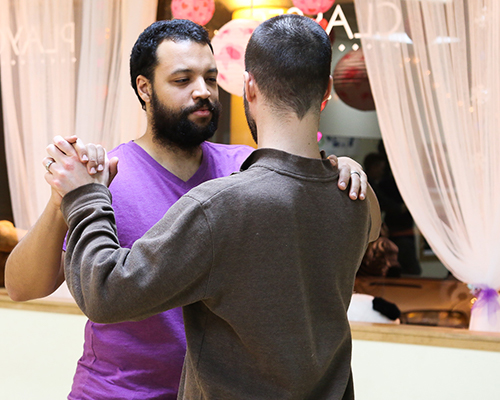“Tango is life,” Antonio Testolin told me, handing over a cup of tea in the bright sunlight of his east side home. A tango teacher of 13 years, Testolin is now teaming up with close friend and fellow dancer Amy Groshek to start Madison’s first Queer Tango and Práctica courses.
Sensing my naiveté regarding the subject, Testolin elaborated, “Tango is life. It really is. You will see everything on the floor: sadness, happiness, passion, loneliness, fear, aggression, on and on…and that is the vocabulary of human beings.” Fascinated, I urged him to start at the beginning.
The basics of tango, I learned, are fairly simple; the dance involves a couple, one lead and one follow, which moves constantly in an oval-like shape on the dance floor. There are also certain codes such as the “cabeceo” or way to ask for a dance using only your eyes. Once these rules are learned, however, the dance is created entirely of what you bring into it.
“Tango is totally improvisational. What you’re doing is working within the shared vocabulary of movements and the formal constraints of the music to produce something that belongs to just the two of you,” Groshek said. Her journey with tango began just two years ago and has since evolved into a lifelong passion. Certain obstacles along the way, however, opened her eyes to the need for a local tango community that is safe and welcoming for queer people.
“It’s hard to get good if you don’t go to the straight community,” Groshek said. Elaborating, she pointed out the double-edged sword of trying to learn an incredibly difficult art form while also navigating a straight community. For gender-queer people especially, negotiating one’s role in a room full of cisgender dancers can be an awkward and isolating experience.
Internationally, such issues of access have been met with thriving queer tango scenes in many cities, first beginning in Germany and Argentina in 2001. These communities, according to Groshek, “are very much a response to rigid gender roles as presumed within the dance.” Instead of playing up the gender binary, which often happens in straight tango communities, queer tango communities generally aim to create a safe, gender-neutral environment in which queer people can learn the dance according to whichever role they desire.
“Leading and following are very polarized, and they are understood in the straight community as aligned with gender roles. What we’re going to do is really different from that,” admitted Groshek. Instead of seeing the roles as a gender interaction, Groshek and Testolin consider them to be a human one. In this way, any individual can identify with either role, and, further, can make that role their own through their unique expression of it on the dance floor.
Opening his laptop and pressing play, Testolin began to hum along with the staccato beats of the tango track. Our conversation shifted along with the music, turning toward the importance of providing a space for people to learn the dance. Aside from the obvious benefits of mastering a style of movement, Testolin and Groshek insist that tango has greater, lifelong rewards such as self-discovery and empowerment.
“Tango is not athletic, it’s more about really understanding yourself as a human being,” Testolin told me.
For queer individuals especially, this journey of self-discovery can be very profound. “A lot of queer people have been taught that the way in which they are embodying is not correct, that it’s not appropriate. And tango [can be] a process of unmaking a lot of learned postures,” Groshek explained.
Testolin and Groshek hope their eight-week Queer Tango and Práctica courses, the first of which began in January, will be the starting-off point for a larger, ongoing queer tango scene in Madison. The pair ultimately wants to provide local LGBTQ individuals with the ability to learn, grow, have fun, and thrive in an accepting community of queer dancers.
The lessons are currently being held Mondays at Happy Bambino on Madison’s east side. Each two-hour session will include an hour of beginner lessons followed by an hour of dance práctica. By giving participants time to socialize and get to know each other through dance, Testolin and Groshek hope to foster the community aspect of the course. At the end of each eight-week session they will hold a “milonga,” or social dance, where participants can dress up and show off their tango abilities.
“A journey of discovery is really what we want to provide,” said Testolin, adding that he hopes participants will “have fun, grow, enjoy, and challenge [themselves].”
Queer tango lessons and práctica are held on Mondays from 7:00 to 9:00 p.m. The cost is $15 for a 2-hour lesson and práctica. Happy Bambino is at 4116 Monona Drive, Madison. For additional details, contact Antonio Testolin, testolina@aol.com, or Amy Groshek, redclient@protonmail.com. You can also like or follow tango Queer Madison on Facebook and Twitter: facebook.com/tangoqueermadison, twitter.com/tangoqueermsn.
























0 Comments